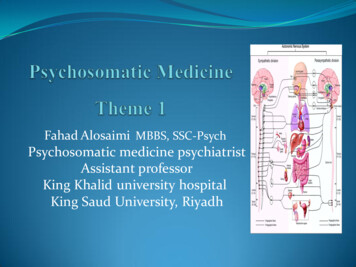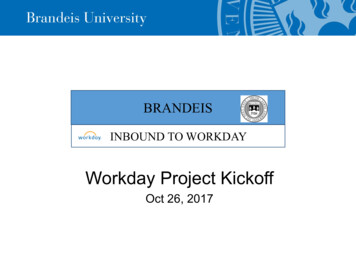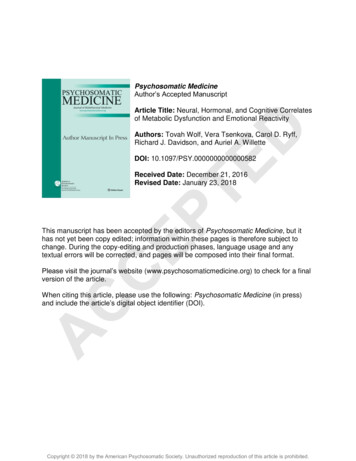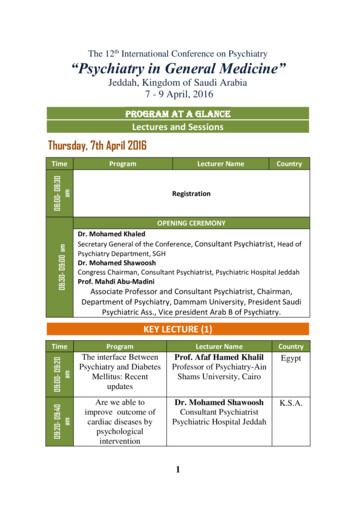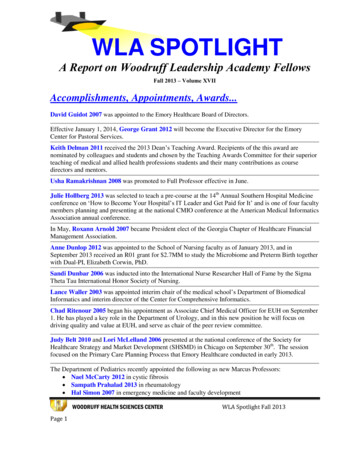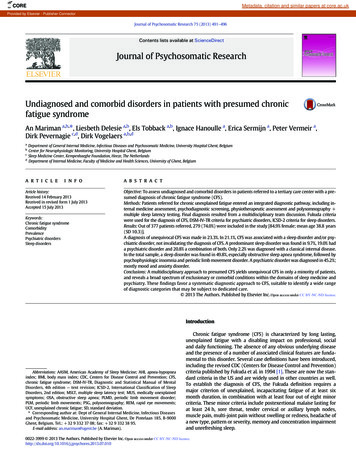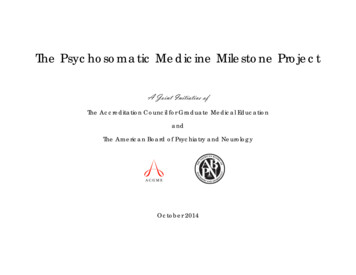
Transcription
The Psychosomatic Medicine Milestone ProjectA Joint Initiative ofThe Accreditation Council for Graduate Medical EducationandThe American Board of Psychiatry and NeurologyOctober 2014
The Psychosomatic Medicine Milestone ProjectThe Milestones are designed only for use in evaluation of fellows in the context of their participation in ACGMEaccredited residency or fellowship programs. The Milestones provide a framework for the assessment of thedevelopment of the fellow in key dimensions of the elements of physician competency in a specialty orsubspecialty. They neither represent the entirety of the dimensions of the six domains of physician competency,nor are they designed to be relevant in any other context.i
Psychosomatic Medicine MilestonesPsychiatry Subspecialty Milestones Chair: Christopher R. Thomas, MDWorking GroupChair: Robert Boland, MDMadeleine Becker, MDCatherine C. Crone, MDLaura Edgar, EdD, CAEJames Levenson, MDMark Servis, MDAdvisory GroupChair: George A. Keepers, MDSteven A. Epstein, MDLarry R. Faulkner, MDChristopher K. Varley, MDii
Milestone ReportingThis document presents Milestones designed for programs to use in semi-annual review of fellow performance and reporting to theACGME. Milestones are knowledge, skills, attitudes, and other attributes for each of the ACGME competencies organized in adevelopmental framework from less to more advanced. They are descriptors and targets for fellow performance as a fellow movesfrom entry into fellowship through graduation. In the initial years of implementation, the Review Committee will examine Milestoneperformance data for each program’s fellows as one element in the Next Accreditation System (NAS) to determine whether fellowsoverall are progressing.For each period, review and reporting will involve selecting milestone levels that best describe each fellow’s current performanceand attributes. Milestones are arranged into numbered levels. Tracking from Level 1 to Level 5 is synonymous with moving fromnovice to expert in the subspecialty. These levels do not correspond with post-graduate year of education.Selection of a level implies that the fellow substantially demonstrates the milestones in that level, as well as those in lower levels(see the diagram on page v).Level 1: The fellow demonstrates milestones expected of an incoming fellow.Level 2: The fellow is advancing and demonstrates additional milestones, but is not yet performing at a mid-fellowship level.Level 3: The fellow continues to advance and demonstrate additional milestones, consistently including the majority ofmilestones targeted for fellowship.Level 4: The fellow has advanced so that he or she now substantially demonstrates the milestones targeted for fellowship.This level is designed as the graduation target.Level 5: The fellow has advanced beyond performance targets set for fellowship and is demonstrating “aspirational” goalswhich might describe the performance of someone who has been in practice for several years. It is expected that onlya few exceptional fellows will reach this level.iii
Additional NotesLevel 4 is designed as the graduation target and does not represent a graduation requirement. Making decisions about readiness forgraduation is the purview of the fellowship program director. Study of Milestone performance data will be required before theACGME and its partners will be able to determine whether milestones in the first four levels appropriately represent thedevelopmental framework, and whether Milestone data are of sufficient quality to be used for high-stakes decisions.Examples are provided with some milestones. Please note that the examples are not the required element or outcome; they areprovided as a way to share the intent of the element.Some milestone descriptions include statements about performing independently. These activities must occur in conformity to theACGME supervision guidelines, as well as to institutional and program policies. For example, a fellow who performs a procedureindependently must, at a minimum, be supervised through oversight.Answers to Frequently Asked Questions about the Next Accreditation System and Milestones are posted on the Next AccreditationSystem section of the ACGME website.iv
The diagram below presents an example set of milestones for one sub-competency in the same format as the ACGME ReportWorksheet. For each reporting period, a fellow’s performance on the milestones for each sub-competency will be indicatedby selecting the level of milestones that best describes that fellow’s performance in relation to those milestones.Selecting a response box in the middleof a level implies that milestones in thatlevel and in lower levels have beensubstantially demonstrated.Selecting a response box on the line inbetween levels indicates that milestonesin lower levels have been substantiallydemonstrated as well as some milestonesin the higher level(s).v
Version 9/2014Psychosomatic Medicine Milestones: ACGME Report WorksheetPC1 — Consultative Patient Care: clarifying the question, gathering data and collateral information, interviewing the patient, and suggestingappropriate diagnostic and treatment options and communicating them effectively to the primary serviceLevel 1Performs simpleconsultations with indirectsupervision, with directsupervision immediatelyavailableLevel 2Manages simpleconsultations in inpatient andoutpatient settingsLevel 3Manages a broad range ofroutine consultation requestsin inpatient and outpatientsettingsRecognizes and addressesunrecognized psychiatricissues that are uncoveredduring the process ofconsultationComments:Level 4Independently managescomplicated and challengingconsultation patients orsituations (e.g., patients whocannot/will not participate inthe interview, are highlyagitated/high-risk, or withcomplicatedmedical/psychiatric illness)Level 5Supervises and serves as arole model for traineesEffectively runs apsychosomatic medicineinpatient consult service oroutpatient clinicNot yet rotatedCopyright (c) Pending. The Accreditation Council for Graduate Medical Education and the American Board of Psychiatry and Neurology. All rights reserved.The copyright owners grant third parties the right to use the Psychosomatic Medicine Milestones on a non-exclusive bases for educational purposes.1
Version 9/2014Psychosomatic Medicine Milestones: ACGME Report WorksheetPC2 — Integrated Patient Care: performing, coordinating, and supervising care in multidisciplinary settings, inpatient or outpatient, and including liaisonand educational rolesLevel 1Provides basic psychiatricassessment and treatmentrecommendations,requiring indirectsupervision with directsupervision availableComments:Level 2Provides basic psychiatricinformation andrecommendations tomultidisciplinary medicaltreatment teamLevel 3Provides comprehensiveintegrated care for patientsthrough collaboration withother providersLevel 4Provides effective care,guidance, and education in amultidisciplinary medicaltreatment team, includingmanaging complex dynamicsaffecting the patient andtreatment team (e.g.,patient who splits treatmentteam)Level 5Leads the psychosocialcomponent of amultidisciplinary medicaltreatment teamNot yet rotatedCopyright (c) Pending. The Accreditation Council for Graduate Medical Education and the American Board of Psychiatry and Neurology. All rights reserved.The copyright owners grant third parties the right to use the Psychosomatic Medicine Milestones on a non-exclusive bases for educational purposes.2
Version 9/2014Psychosomatic Medicine Milestones: ACGME Report WorksheetMK1 — Knowledge regarding Psychiatric Illnesses in the Medically Ill: assessment and management of major psychiatric disorders, substance usedisorders, somatic symptom disorders, adjustment disorders, and psychological factors affecting medical conditionsLevel 1Demonstrates limitedknowledge regardingcommon psychiatricillnesses and theirtreatments in themedically illComments:Level 2Demonstrates basicknowledge regardingepidemiology, etiology,phenomenology, prognosis,and treatment of commonpsychiatric illnesses in themedically ill, includingcommon adverse effects anddrug-drug interactionsLevel 3Demonstratescomprehensive knowledgeregarding the assessmentand management ofpsychiatric illnesses in themedically ill, includingdetailed knowledge ofadverse effects and drugdrug interactionsLevel 4Demonstratescomprehensive knowledgeregarding the presentationand assessment ofcomplex/atypical psychiatricillnesses in the medically ill,including advancedknowledge in specific medicalpopulations (e.g., cancer,transplant, OB-GYN)Level 5Develops, synthesizes, orpresents new knowledgeregarding psychiatricillnesses and theirtreatments in the medicallyillNot yet rotatedCopyright (c) Pending. The Accreditation Council for Graduate Medical Education and the American Board of Psychiatry and Neurology. All rights reserved.The copyright owners grant third parties the right to use the Psychosomatic Medicine Milestones on a non-exclusive bases for educational purposes.3
Version 9/2014Psychosomatic Medicine Milestones: ACGME Report WorksheetMK2 — Knowledge regarding Psychiatric Manifestations of Medical Illnesses: assessment and management of physical and psychological reactions tomedical illness and its treatmentLevel 1Demonstrates limitedknowledge regardingcommon psychiatricmanifestations of medicalillnesses and theirtreatments (e.g., delirium,syndromes and symptomssecondary to medicalconditions)Comments:Level 2Demonstrates basicknowledge regarding thepresentation and treatmentof psychiatric symptomscaused by common medicalillnesses and theirtreatmentsLevel 3Demonstratescomprehensive knowledgeregarding the assessmentand management ofpsychiatric symptoms causedby common medical illnessesand their treatmentsLevel 4Demonstratescomprehensive knowledgeregarding the assessment andmanagement of psychiatricsymptoms caused bycomplex/uncommon medicalillnesses and their treatmentsLevel 5Develops, synthesizes, orpresents new knowledgeregarding psychiatricsymptoms caused bymedical illnesses and theirtreatmentsNot yet rotatedCopyright (c) Pending. The Accreditation Council for Graduate Medical Education and the American Board of Psychiatry and Neurology. All rights reserved.The copyright owners grant third parties the right to use the Psychosomatic Medicine Milestones on a non-exclusive bases for educational purposes.4
Version 9/2014Psychosomatic Medicine Milestones: ACGME Report WorksheetMK3 — Practice of Psychosomatic MedicineA. Ethics and legal issuesB. Models of consultation and collaborative careC. Issues in diverse populations (e.g., cultural, ethnic, developmental, gender, sexual orientation)Level 11A Demonstrates limitedknowledge of clinicallyrelevant legal and ethicalissues in medical settings(e.g., capacity evaluations)Level 22A Demonstrates knowledgeof essential ethical and legalissuesLevel 33A Demonstratescomprehensive knowledge ofclinically relevant legal andethical issues in medicalsettings (e.g., capacityevaluations)Level 44A Demonstrates advancedknowledge of clinicallyrelevant legal and ethicalissues in medical settings,including in difficult andchallenging situationsLevel 55A Functions as leader orexpert in institutional ethicalor legal processes1B Demonstrates limitedknowledge of consultationand collaborative caremodels2B Demonstrates basicknowledge of commonconsultation andcollaborative care models3B Demonstratescomprehensive knowledge ofconsultation andcollaborative care models4B Demonstrates advancedknowledge of consultationand collaborative caremodels, including emergingnew modes of clinical care5B Explores new forms ofcare models or performshealth services research inconsultation andcollaborative care1C Recognizes importanceof delivering culturallycompetent care2C Demonstrates recognitionof issues in deliveringculturally-competent care3C Consistently demonstratesawareness and skill regardingthe impact of culturaldifferences in patient care4C Anticipates the impact ofdiversity on patient care andserves as role model inprovision of care in diversegroups5C Generates newunderstanding of diversityissuesComments:Not yet rotatedCopyright (c) Pending. The Accreditation Council for Graduate Medical Education and the American Board of Psychiatry and Neurology. All rights reserved.The copyright owners grant third parties the right to use the Psychosomatic Medicine Milestones on a non-exclusive bases for educational purposes.5
Version 9/2014Psychosomatic Medicine Milestones: ACGME Report WorksheetSBP1 — Patient Safety and the Health Care TeamA. Medical errors and quality improvement activitiesB. Communication and patient safetyC. Regulatory and educational activities related to patient safetyLevel 11AB Describes the commonsystem causes for errors(e.g., communicationfailures, equipmentfailures, and other failuresof the health care deliverysystem)1C Follows institutionalsafety policies, includingreporting of problematicbehaviors and processes,errors, and near missesComments:Level 22A Describes systems andprocedures that promotepatient safetyLevel 33A Understands andconsistently uses safetyproceduresLevel 44A Skillfully participates andcontributes in amultidisciplinary context inquality improvement andpatient safety projects (e.g.,morbidity and mortalityconference, root causeanalysis meeting)2B Effectively and regularlyuses all appropriate forms ofcommunication to ensureaccurate transitions of care3B Displays effectivecommunication withcolleagues and recognizesspecial circumstances thatwill affect safety4B Takes a leadership role inensuring coordinated patientcare, including accuratetransitions of care2C Follows regulatoryrequirements related toreporting requirements andprescribing practices3C Effectively communicatessafety procedures andrequirements to trainees andother audiences4C Develops content forand/or facilitates patientsafetypresentations/conferencesfocusing on systems-basederrors in patient careLevel 55A/B/C Providesorganizational leadership orconsultation to improve carequality and patient safety5A/B/C Implementsinnovative systems toimprove care quality andpatient safety5A/B/C Develops newcurricula and approaches toeducation in safety andquality issues5A/B/C Contributes on aregulatory level to safetyand quality improvementNot yet achieved Level 1Copyright (c) Pending. The Accreditation Council for Graduate Medical Education and the American Board of Psychiatry and Neurology. All rights reserved.The copyright owners grant third parties the right to use the Psychosomatic Medicine Milestones on a non-exclusive bases for educational purposes.6
Version 9/2014Psychosomatic Medicine Milestones: ACGME Report WorksheetSBP2 — Resource Management: costs of care and resource selectionLevel 1Recognizes disparities inhealth care at individualand community levelsLevel 2Coordinates patient access tocommunity and systemresourcesKnows the relative cost ofcare (e.g., medications,diagnostics, levels of care,procedures)Understands health carefunding and regulationsrelated to organization ofhealth care servicesComments:Level 3Consistently provides costeffective care, usinga variety of resources,including the ElectronicMedical Record (EMR)Level 4Practices efficient, costeffective, high-value clinicalcare, using a full range ofresources, in routine andcomplex casesLevel 5Designs new approaches toprovide efficient care tomonitor and educateregarding health careresource useAdvocates for improvedaccess to and additionalresources within systems ofcareNot yet achieved Level 1Copyright (c) Pending. The Accreditation Council for Graduate Medical Education and the American Board of Psychiatry and Neurology. All rights reserved.The copyright owners grant third parties the right to use the Psychosomatic Medicine Milestones on a non-exclusive bases for educational purposes.7
Version 9/2014Psychosomatic Medicine Milestones: ACGME Report WorksheetSBP3 — Community-based Care: community-based programs; self-help groups, including 12-step approaches; medical, psychiatric, and substance abuserecovery/rehabilitation programsLevel 1Has a basic knowledge oflocal health care deliverysystemsComments:Level 2Has a basic knowledge ofcommunity resources;coordinates care withcommunity mental healthagencies, schools, and otheragencies; recognizesimportance of self-helpgroups, and recovery andrehabilitation approachesLevel 3Incorporates communityresources, self-help groups(including 12-stepapproaches), and socialnetworks in clinical care;appropriately refers torehabilitation and recoveryprogramsLevel 4Skillfully uses a wide range ofcommunity-based resourcesfor rehabilitation andrecovery, including inchallenging cases of comorbid chronic medical andpsychiatric illnessesLevel 5Develops new careprograms and newapproaches to link medicaland community-basedprogramsNot yet achieved Level 1Copyright (c) Pending. The Accreditation Council for Graduate Medical Education and the American Board of Psychiatry and Neurology. All rights reserved.The copyright owners grant third parties the right to use the Psychosomatic Medicine Milestones on a non-exclusive bases for educational purposes.8
Version 9/2014Psychosomatic Medicine Milestones: ACGME Report WorksheetSBP4 — Consultation to Health Care SystemsLevel 1Describes how systemsissues affect clinical careComments:Level 2Identifies systems issues inclinical care and clarifiesrequired interactions andcommunicationLevel 3Communicates with otherproviders and provideseffective recommendationsregarding systems issues inclinical careLevel 4Provides expert, advancedrecommendations to addresssystems issues in clinical care,including in challenging andcomplex situations requiringnovel managementLevel 5Measures outcomes ofsystems-basedinterventions, contributes toimprovement of existingservice delivery systems, ordevelops new modes ofhealth care deliveryNot yet achieved Level 1Copyright (c) Pending. The Accreditation Council for Graduate Medical Education and the American Board of Psychiatry and Neurology. All rights reserved.The copyright owners grant third parties the right to use the Psychosomatic Medicine Milestones on a non-exclusive bases for educational purposes.9
Version 9/2014Psychosomatic Medicine Milestones: ACGME Report WorksheetPBLI1 — Lifelong LearningA. Self-assessment and self-improvementB. Use of evidence-based medical knowledgeLevel 11A Regularly seeks andincorporates feedback toimprove performance;identifies self-directedlearning goals andperiodically reviews themwith supervisory guidanceLevel 22A Demonstrates a balancedand accurate self-assessmentof own competence, usingclinical outcomes to identifyareas for continuedimprovementLevel 33A Demonstratesimprovement in clinicalpractice based on continualself-assessment andevidence-based informationLevel 44A Identifies and meets selfdirected learning goals with littleexternal guidance; keeps up withrelevant changes in medicalknowledge using a system orprocess2; recognizes limits of ownknowledge1B Formulates a searchablequestion from a clinicalquestion2B Selects an appropriate,evidence-based informationtool1 to meet self-identifiedlearning goals3B Efficiently searches anduses medical literature toanswer clinical questions;critically appraises differenttypes of research, includingrandomized controlled trials,systematic reviews, metaanalyses, and practiceguidelines4B Consistently makes informed,evidence-based clinical decisions;demonstrates a recognizedmastery of the knowledge baseof psychosomatic medicineComments:Level 55A/B Synthesizes andpresents new findings;develops educationalmethodology tocommunicate newmedical knowledgeNot yet achieved Level 1Footnotes:1Examples include: practice guidelines; PubMed Clinical Queries; Cochrane, DARE, or other evidence-based reviews; Up-to-Date, etc.2Examples include: a performance-in-practice (PIP) module as included in the American Board of Psychiatry and Neurology (ABPN) Maintenance ofCertification (MOC) process; or regular and structured readings of specific evidence sources.Copyright (c) Pending. The Accreditation Council for Graduate Medical Education and the American Board of Psychiatry and Neurology. All rights reserved.The copyright owners grant third parties the right to use the Psychosomatic Medicine Milestones on a non-exclusive bases for educational purposes.10
Version 9/2014Psychosomatic Medicine Milestones: ACGME Report WorksheetPBLI2 — TeachingA. Development as a teacherB. Observable teaching skillsLevel 11A Assumes a role in theclinical teaching oftrainees, and assists facultymembers in providingsupervision to theselearnersLevel 22A Participates in activitiesdesigned to develop andimprove teaching skills, andassists faculty members inproviding supervision totrainees (e.g., medicalstudents, residents) inpsychosomatic medicinesettingsLevel 33A Actively participates indidactic presentations onpsychosomatic medicinetopics to groups (e.g., grandrounds, case conference,journal club)Level 44A Independently developsand provides consistentlyeffective presentations onpsychosomatic medicine togroups, including to healthprofessionals in nonpsychiatric disciplinesLevel 55A Is recognized as aneducator of colleagues, thebroader professionalcommunity, and/or thepublic1B Recognizes role ofphysician as teacher2B Evaluates and providesfeedback to trainees, andcommunicates goals andobjectives for instruction oftrainees3B Effectively teachesindividual trainees in clinicalsettings; effectively usesfeedback on teaching toimprove teaching methodsand approaches4B Demonstrates recognizedskill in the education oftrainees, including those innon-psychiatric disciplines5B Organizes and developscurriculum materialsrelevant to psychosomaticmedicineComments:Not yet achieved Level 1Copyright (c) Pending. The Accreditation Council for Graduate Medical Education and the American Board of Psychiatry and Neurology. All rights reserved.The copyright owners grant third parties the right to use the Psychosomatic Medicine Milestones on a non-exclusive bases for educational purposes.11
Version 9/2014Psychosomatic Medicine Milestones: ACGME Report WorksheetPROF1 — Compassion, Integrity, and RespectA. Compassion for others, self-reflection, sensitivity to diverse patient populationsB. Adherence to ethical principlesLevel 11A Demonstrates capacityfor self-reflection,empathy, openness todifferent beliefs, andrespect for diversity;provides examples of theimportance of attention todiversity in psychiatricevaluation and treatmentLevel 22A Routinely displaysempathy, compassion, andsensitivity to diversity inpsychiatric evaluation andtreatment1B Recognizes ethicalconflicts in practice andseeks supervision tomanage them2B Analyzes and managesethical issues in commonclinical situations in thepsychosomatic medicinesettingComments:Level 33A Facilitates positivecommunication and developsa mutually agreeable careplan in the context ofconflicting physician, patient,and/or family values andbeliefs3A Discusses own culturalbackground and beliefs andthe ways in which theseaffect interactions withpatients3B Manages ethical issues ina wide range of clinicalsituations in thepsychosomatic medicinesettingLevel 44A Consistently displayscompassion, integrity, andsensitivity, including in themore challenging areas ofmedical practiceLevel 55A Serves as a role modeland teacher of compassion,integrity, respect for others,and sensitivity to diversepatient populations4A Displays recognizedexpertise in, and leadseducational activitiesregarding, ethical andpractice issues4B Systematically analyzesand manages complex ethicalissues in psychosomaticmedicine (e.g., end-of-lifedecisions)5B Identifies emergingethical issues within subspecialty practice and candiscuss opposing viewpointsNot yet achieved Level 1Copyright (c) Pending. The Accreditation Council for Graduate Medical Education and the American Board of Psychiatry and Neurology. All rights reserved.The copyright owners grant third parties the right to use the Psychosomatic Medicine Milestones on a non-exclusive bases for educational purposes.12
Version 9/2014Psychosomatic Medicine Milestones: ACGME Report WorksheetPROF2 — Accountability to Self, Patients, Colleagues, and ProfessionA. Work balance and fatigue managementB. Professional behavior and participation in professional communityLevel 11A Notifies team andenlists appropriatecoverage for clinical andnon-clinical responsibilitieswhen fatigued or illLevel 22A Identifies and managessituations in whichmaintaining personal healthis challenged, and seeksassistance when neededLevel 33A Demonstrates healthy andresponsible work style; takessteps to address impairmentin self and in colleagues ifpresentLevel 44A Effectively prioritizes andbalances conflicting interestsof self, family, and others tooptimize medical care andpractice of professionLevel 55A Participates as an activemember on committees orin organizations thataddress physician wellness1B Follows institutionalpolicies for physicianconduct and responsibility2B Recognizes theimportance of participating inone’s professionalcommunity3B Displays professionalismin work, collaborateseffectively with colleagues,maintains skills (e.g.,prepares for obtaining andmaintaining boardcertification), andconsistently displaysresponsibility for ensuringthat patients receive the bestpossible care4B Participates in the primaryspecialty and subspecialtyprofessional community (e.g.,professional societies,patient advocacy groups,community serviceorganizations); displaysexemplary professionalismand serves as role model inensuring that patientsreceive best possible care5B Develops organizationalpolicies, programs, orcurricula for professionalismComments:Not yet achieved Level 1Copyright (c) Pending. The Accreditation Council for Graduate Medical Education and the American Board of Psychiatry and Neurology. All rights reserved.The copyright owners grant third parties the right to use the Psychosomatic Medicine Milestones on a non-exclusive bases for educational purposes.13
Version 9/2014Psychosomatic Medicine Milestones: ACGME Report WorksheetICS1 — Relationship Development and Conflict ManagementA. Relationship with patientsB. Conflict management with patients, families, colleagues, and members of the health care teamLevel 11A Develops therapeuticrelationship with patientsand their families, is awareof cultural diversity incommunicating withpeople of differentbackgrounds1B Recognizescommunication conflicts inwork relationshipsComments:Level 22A Develops therapeuticrelationships with patients; isrespectful of culturaldiversity in discussions withpatients and their families2B Develops workingrelationships acrossspecialties and systems ofcare in uncomplicatedsituationsLevel 33A Skillfully formstherapeutic relationship witha wide range of patients inthe psychosomatic medicinesetting3B Appropriately sustainsworking relationships in theface of conflict or differencesin opinions with otherservices or colleagues, and isable to efficiently resolveroutinely-encounteredconflictsLevel 44A/B Sustains therapeuticand working relationships incomplex and challengingcontexts, including insituations with significantdifferences of opinion amongcare providers, families, andpatientsLevel 55A/B Develops approachesto managing difficultsituations andcommunications in thepsychosomatic medicinesetting5A/B Effectively mentorsother health care providersin leadership,communication skills, andconflict management5A/B Engages in scholarlyactivity (e.g., teaching,research) regardingteamwork and conflictmanagementNot yet achieved Level 1Copyright (c) Pending. The Accreditation Council for Graduate Medical Education and the American Board of Psychiatry and Neurology. All rights reserved.The copyright owners grant third parties the right to use the Psychosomatic Medicine Milestones on a non-exclusive bases for educational purposes.14
Version 9/2014Psychosomatic Medicine Milestones: ACGME Report WorksheetICS2 — Information Sharing and Record KeepingA. Accurate documentation and effective communication with health care team and patientsB. Maintaining professional boundariesLevel 11A Ensures transitions ofcare are accuratelydocumented, amd that thewritten record is accurateand timely, with attentionto preventing confusionand error, consistent withinstitutional policies1A Organizes both writtenand oral information to beshared with patient, family,team, and others1B Maintains appropriateboundaries in sharinginformation by electroniccommunication and in theuse of social mediaComments:Level 22A Provides complete, timely,and accurate documentation2A Consistently demonstratescommunication strategies toensure patient and familyunderstanding, including use ofeasy-to-understand language,skillful use of interpreters, andface-to-face interaction whileusing EMR2B Demonstrates respect forpatient confidentialityLevel 33A Demonstrates effectiveverbal and writtencommunication withpatients, families,colleagues, and other healthcare providers that isappropriate, efficient,concise, and pertinent3A Consistently engagespatients and families inshared decision making3B Consistently maintainsprofessional boundaries andrespect for confidentialityLevel 44A Demonstratescommunication that isappropriate, efficient, concise,and pertinent in challengingsituations (e.g., significantdifferences of opinion, withpatients with limitedcommunication and/orcognitive abilities, etc.)Level 55A/B Develops newmodes of systemorganization to facilitatecommunication andmaintenance ofprofessional relationships4A Recruits appropriateassistance when culturaldifferences create barriers topatient care4B Uses discretion andjudgment in the inclusion ofsensitive patient material inthe medical record and in allcommunication with patients,families, and colleaguesNot yet achieved Level 1Copyright (c) Pending. The Accreditation Council for Graduate Medical Education and th
The Psychosomatic Medicine Milestone Project . A Joint Initiative of . The Accreditation Council for Graduate Medical Education . and . The American Board of Psychiatry and Neurology . This document presents M ilestones designed for programs to use in semi-annual review of fellow performance and reporting to the ACGME. Milestones are .


